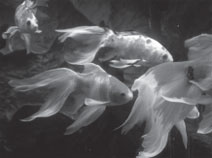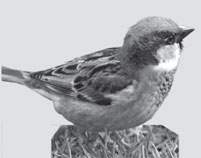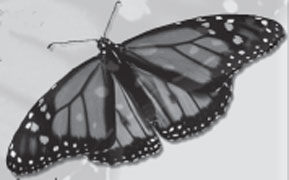Poetry about fish, birds and butterflies
 Many poets have written about animals, in many different ways. The
first poem given here seems essentially whimsical, relating the
adventures of little fish that got to land and proceeded to enjoy
themselves outrageously. Apart from flying kites, they were rumoured to
have enjoyed themselves in night clubs. Many poets have written about animals, in many different ways. The
first poem given here seems essentially whimsical, relating the
adventures of little fish that got to land and proceeded to enjoy
themselves outrageously. Apart from flying kites, they were rumoured to
have enjoyed themselves in night clubs.
The poem is translated by S Pathmanathan from an original work by
Cheliyan, the pen-name of S Sivakumaran. Born in 1960, he was involved
early on in Tamil politics, but left Sri Lanka in 1986 as a refugee and
has lived in Canada ever since. One wonders therefore whether the fry
are not a metaphor for emigrants like himself, who left a relatively
simple background for the complexities of the West, and ended up
dissolving 'their hearts in the frothing beer... weeping on the banks of
the Thames'. Be that as it may, the poem is immensely engaging.
The little fry that left the sea
the fry
enjoying a swim by the shore
leaped up in joy
to find themselves on land
 they rolled on the sand they rolled on the sand
flew kites with the children
stood in the hot sun
perspiring
sucked popsicles
spat out complaining
that the sea water was salty
they climbed up the temple dome
gazed in wonder
and whistled
looked awe stricken
at the man
who laid flat a pretty women
and held her lips in his
they were in no mood
to get back to the sea
in the dark they climbed the golden leaves
and stayed there
staring, staring
in the morning
the branches that had lost their leaves
and
the children who had lost their kites
tired themselves
looking for the missing fry
the house-fly brought the news
that the fry had been seen
dancing in the night clubs
the insect lamented that they were loafing
with a handsome singer
the robin swore
that they had dissolved their hearts in the frothing beer
and were found weeping
on the banks of the Thames
the little fry
that left the sea
never ever
returned to it
The next poem, by Siri Gunasinghe and translated by his wife
Hemamali, tells a much sadder story, of a bird trapped in an empty
house. The simple language makes clear the bleak situation of the
sparrow from the start, but tension mounts with the repeated mention of
the glass barrier that hems him in. The end however is sudden, in three
lines that mount with small changes to a brutal climax.
Again, one can see the poem as a metaphor, for the seemingly slight
restraints that hem us in and in the end destroy us. Such wider
implications are not thrust upon us, but the poem increases our
awareness of the difficulties that confront all of us, and how we
respond to them. Both Siri and Hemamali, it should be noted, are also in
Canada, not exactly in exile, but sadly lost to this country as far as
employment goes.
The sparrow
In the empty house
the sparrow
is alone
he has no escape.
In the empty house
the walls are solid
unbreakable.
 In the empty house In the empty house
the doors and windows are closed shut
unshakable.
The light streams in
through the glass panes
the boundless light of freedom outside.
Beyond the window
there's no loneliness
there's his bird-wife
his little nestlings
there warmth to nestle in
there, winged freedom flies everywhere.
Piercing the glassy space
the sparrow cannot escape.
The joy so near his beak
is barred by the thin film of glass?
that first reveals and then denies
his joy.
Impossible to fly over
impossible to fly under
the glassy sky
arrests the flight
breaks the flight
breaks the neck.?
Frozen
stiff
wings folded
feet curled
life tumbles
and lies still.
Finally, I include a poem by Richard de Zoysa, written under the pen
name Angela de Silva which he used for his more allusive work - though I
must admit we sometimes forgot which was meant to belong where, when we
published his poems in 'The New Lankan Review'.
'Lepidoptera', the title taken from the scientific name for
butterflies, was written after he had had a particularly grueling class
with one of the students who came to us for tuition after S. Thomas' had
got rid of us. The theme was brought home to me a couple of years later,
when one of my brightest youngsters won a scholarship to Eton, and his
housemaster and I tried hard to get him into Oxford. We failed, and the
housemaster wrote to me to say that, promising though the boy was, S.
Thomas' had failed to teach him how to think.
The story had a happy ending in that, after a perfectly good degree
from London, he went on to Oxford for his postgraduate work. I realize
too that S. Thomas' alone was not to blame, given the limits imposed by
our educational system. However, I still think that private schools
should do more, and the example of what say Ladies College was doing in
those days suggests that you can stretch young minds in the day they
require, even while working within a restricting system.
The poem is not easy to understand, but I found over the years that
it was a good example of how careful reading revealed basic as well as
subtle meaning. Students were asked to note first that the odd word
'schoolroom' makes clear that the subject of the poem is not simply a
butterfly. It must be a student and, since the subject of the first
sentence is 'mind', we can understand that the poem is about learning,
or rather difficulties in the way of learning.
Once that basic fact is registered, the general thrust of the poem is
clear. Some of the language is unusual, but I did not think it always
necessary to explain why Richard had talked about 'velvet softness and
smoothness'. The operative word was fragility, and once this was
understood students understood the stress on an innocence that was
rendered more helpless. Oddly enough, university students engaged in
what they termed struggles, certainly not seeing themselves as innocent,
appreciated the critique of a system that encouraged them to passively
absorb rather than actively think.
Rereading the poem, I see again the student who inspired it, on one
of those long afternoons in 8th Lane where we taught. That story too had
a happy ending, for the boy inherited a business and I gather had helped
it to flourish. But not everyone is so lucky. And Richard, if neither
fry nor butterfly, certainly had a fate like the sparrow of Siri
Gunasinghe's poem.
Lepidoptera
 On broken butterfly wing, your crippled mind On broken butterfly wing, your crippled mind
fluttered into my schoolroom. Failed. And died.
I couldn't do a thing to stir its organs
of poor maimed sense to life again.
Only sensation. Reflex twitch
of feelers. And for me sentiment.
Occasional small rapture at your velvet
softness and smoothness. Soon the ants of time
carry you away from chalk and Chaucer
into oblivion.
Farewell, lovely.
The heavy footed State, which made a mess
of your fragility, called this progress,
should pin you down on cardboard behind glass
specimen of the educated class.
|

